1 - Expected post-Chinafy results
Top 3 Baidu SEO Tools in 2024: How to optimise your website for Baidu search in China
In this article, we will cover three powerful tools and strategies for reaching Chinese online users using Baidu Search.
Before diving into the specifics of these Baidu platforms, let’s go into some context behind Baidu and the broader Chinese online consumer landscape.
What is Baidu?
Baidu is a leading Chinese multinational technology company most widely known for its search engine.
Founded in 2000 and a pioneer in online advertising on its search engine, it is most often referenced outside of China as a “Google of China” with its similar large suite of different web services and functionalities within the company.
Programs on Baidu similar to those seen on the global web include Baidu Maps, Baidu Baike (similar to Wikipedia), Baidu Translate, Baidu Zhidao (a Q&A platform), Baidu Wangpan (a cloud storage service), Baidu News, and more.
Also similar to Google, Baidu also has several tools to improve search presence and ranking on its search engine including Baidu Index, Baidu Webmaster Tools, and Baidu Keyword Planner.
Some key differentiators between Baidu and Google include specific search features for patents, missing persons, and senior citizens..
With its continuous development in their platform - including advances in AI, Baidu supports over 60% of internet search queries made in China in 2023 and likely to remain the most popular search engine in China by market share.
Powerful Baidu tools to improve your SEO
At a Glance: Quick Comparisons between Baidu Webmaster Tools vs. Baidu Index vs. Baidu Keyword Planner
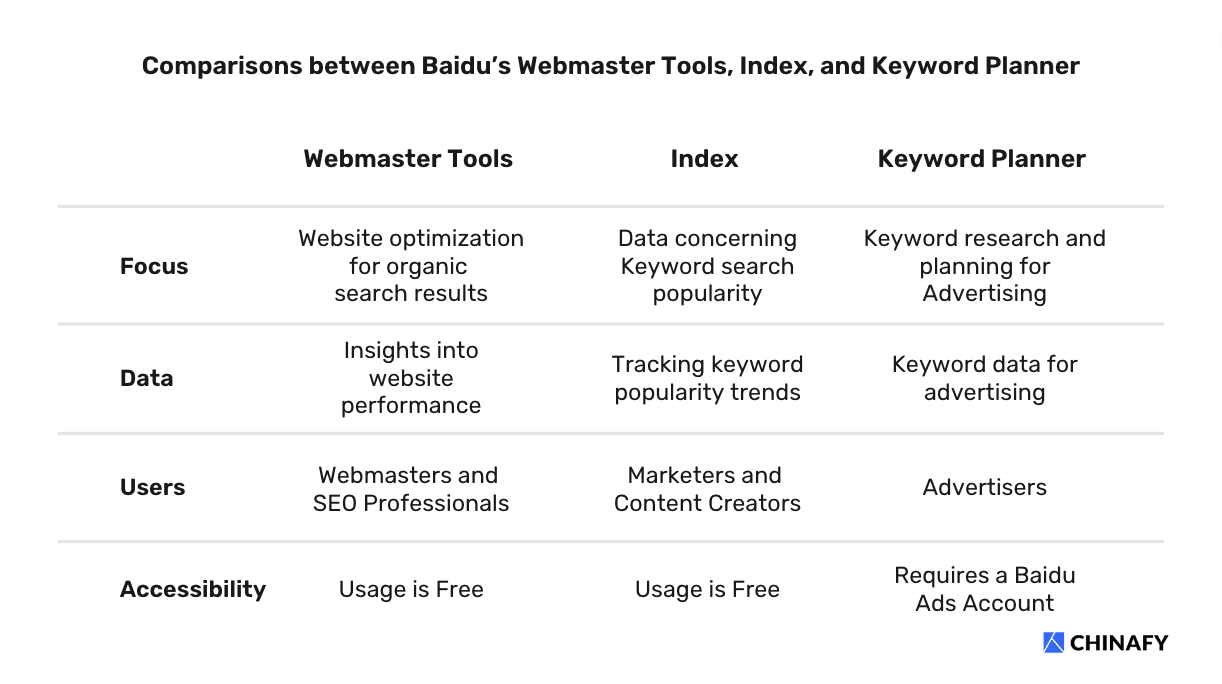
Baidu Webmaster Tools
What is Baidu Webmaster Tools?
Baidu Webmaster Tools is a service designed to aid digital marketers, webmasters, SEO professionals, and others involved in operating a website to optimize their websites for Baidu's search engine.
With Baidu Webmaster Tools, users can submit their websites for indexing, monitor site performance, access data on site traffic, keywords, and backlinks, and receive insights and recommendations for improving their site's visibility and search engine ranking on Baidu. It also provides valuable tools and resources to enhance website SEO, resolve indexing issues, and aid in achieving better organic search results on China's most widely used search engine.
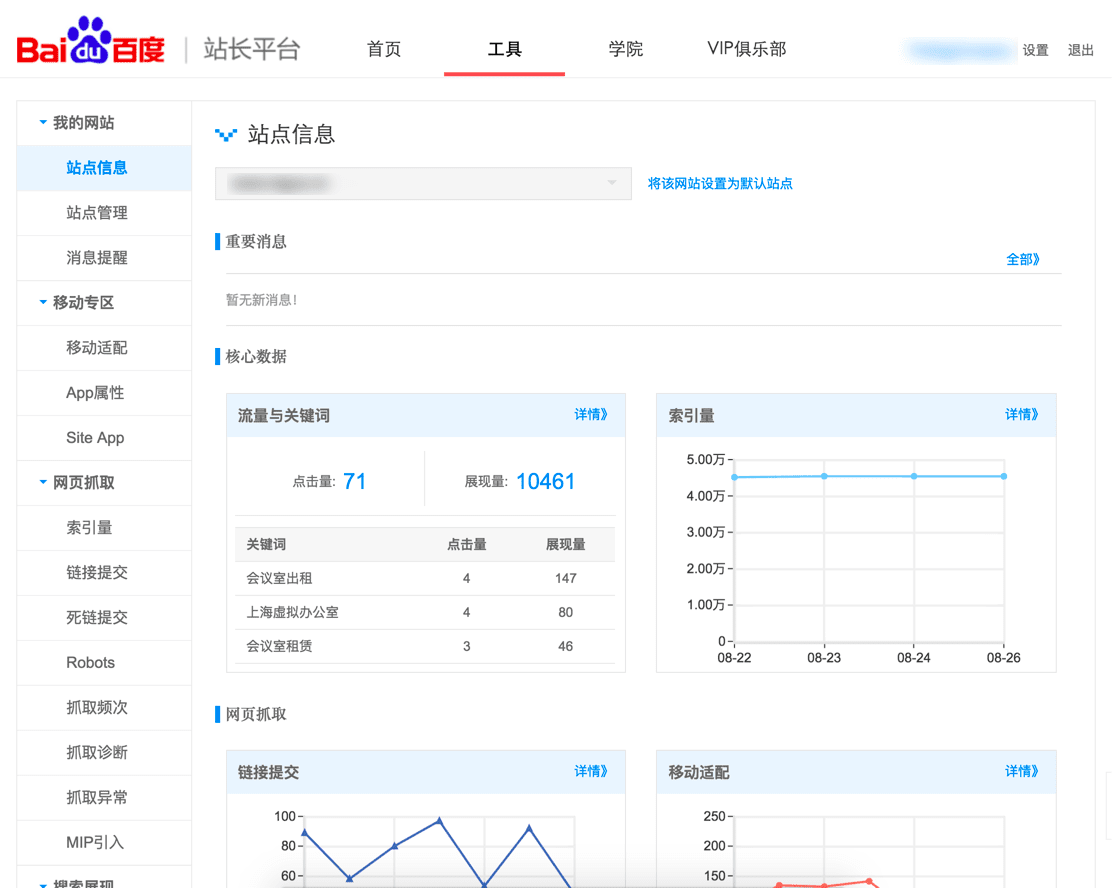
Some of Baidu Webmaster Tools’ most notable features include -
Site submission and verification
Content submission for indexing
Sitemap submission
Indexing status and data
Keyword analysis
Crawl error reports
Backlink analysis.
Security and malware scanning
You may get started with Baidu Webmaster Tools with either an individual user’s account or an enterprise account.
Baidu Keyword Planner
What is Baidu Keyword Planner?
Baidu Keyword Planner is a valuable keyword research and analysis tool provided by Baidu, the leading search engine in China. Due to its name and features, it is often likened to Google Adwords Keyword Planner.
It provides a crucial resource for marketers, advertisers, and SEO experts by allowing you to pinpoint the most relevant and high-performing keywords for their online content and advertising initiatives.
With Baidu Keyword Planner, users can delve into keyword search volume trends, assess competition levels, and explore related keyword suggestions. This data-driven approach empowers them to optimise website content effectively and craft targeted paid advertising campaigns on the Baidu platform.
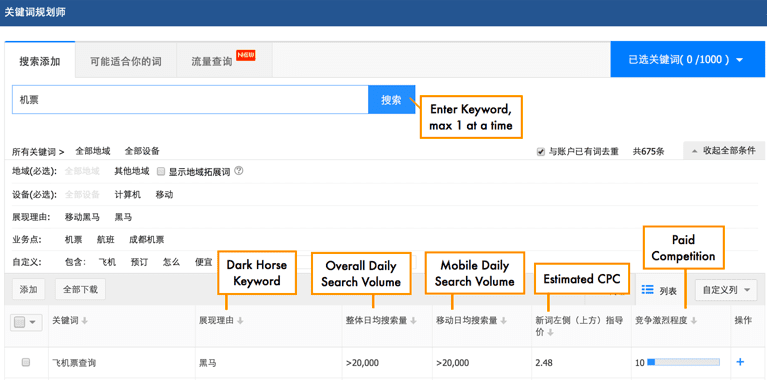
A screenshot of Baidu Keyword Planner in action, as seen on Dragonmetrics
Baidu Keyword Planner’s features include
Suggested Keywords
Search volume and competition analysis.
Estimated bid cost for keyword advertising.
Campaign planning using Keyword Grouping
One caveat to Baidu Keyword Planner is that it is only available to Baidu advertising accounts.
Setup for a Baidu Search Engine Marketing account will take place after a conversation with a Baidu representative and these conversations are in Chinese only, with some clients opting to go through a Baidu advertising service.
Learn more about setting up a Baidu advertising account here.
Baidu Index
What is Baidu Index?
Baidu Index, also known as Baidu Zhishu (Baidu Spider, 百度指数), is a search trend analysis tool by Baidu. “Baidu Spider” is the official name of the search engine’s web crawling spider that crawls web pages and returns updates to the Index.
Baidu Index supplies insights into the ebb and flow of search queries on the Baidu platform. Users can harness
Baidu Index is used to monitor the trends and search volumes associated with specific keywords and subjects over time. This invaluable tool proves indispensable for marketers, businesses, and content creators aiming to keep their fingers on the pulse of trends, sense user interests, and evaluate the efficacy of their content strategies in the Chinese market.
The platform also helps visualise various marketing and SEO metrics. Often likened to Google Trends, some tools include keyword visualisation for popularity and relevance, source and destination keyword mapping, and related + emerging keywords.
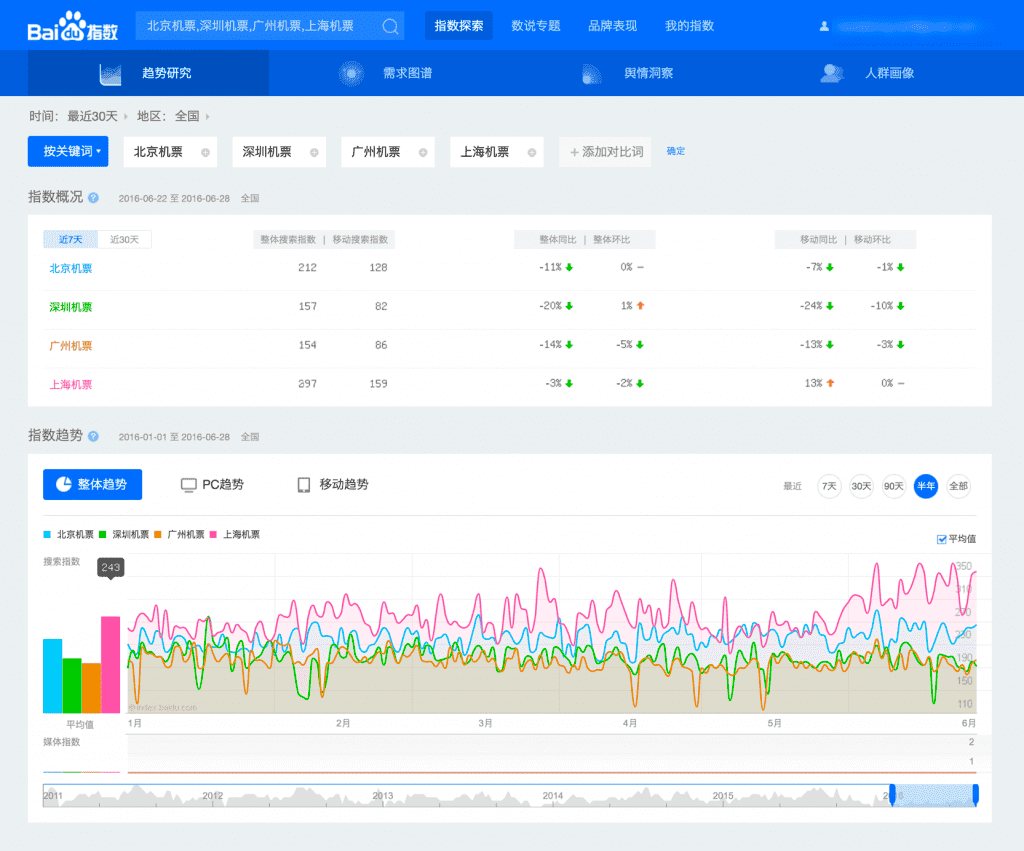
A screenshot of Baidu Index in action, as seen on Dragonmetrics
Baidu Index’s features include
Keyword search volume
Keyword trend analysis
Keyword Popularity comparisons
Related search queries.
Geographic distribution of keyword searches
Seasonal trends
Historical data
Various filters can also be applied to the datasets, including comparisons of search trends by geographic location, age, gender, etc.
Baidu Index is another service available through creating a Baidu account.
How to use these Baidu tools to optimise your website in China
The primary purpose of these tools is to optimise your search presence on Baidu.
With a strong SEO and organic presence plus the ability to target keywords for your website, you can improve your searchability and discoverability for users within China. Whilst there are even further steps that can be taken to increase your website’s presence on Baidu, a strong search presence should only be part of your consideration.
While users may find your site organically or via paid ads, they may often fail to access it.
Due to the unique nature of the internet in China, even the best marketing strategies will underperform due to websites either being too slow to load or are altogether inaccessible in China, which also negatively affects your search rankings on Baidu.
Having an accessible and effective website for users in China is crucial, but around 93% of websites built for global audiences are not optimised for access in China
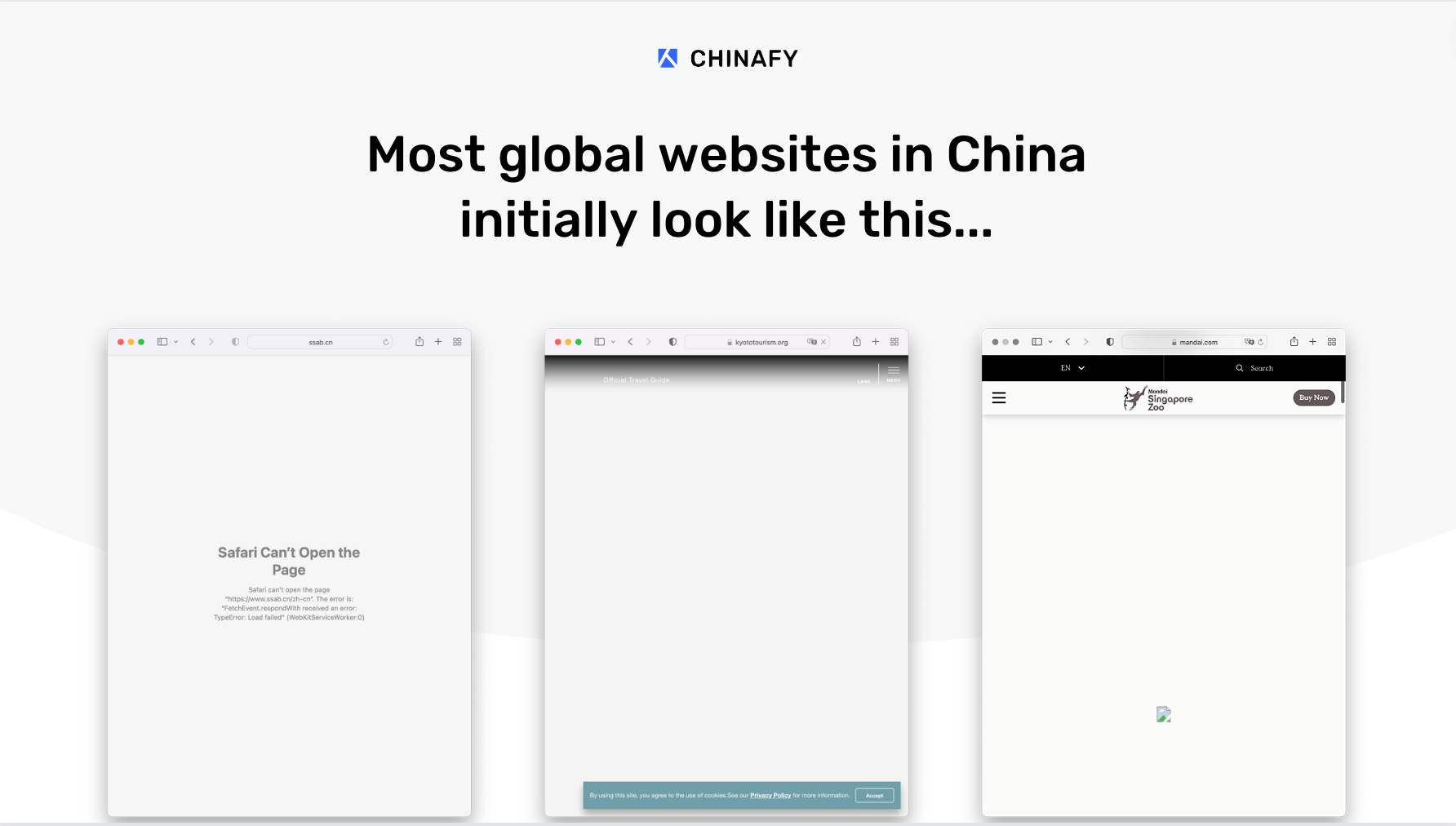
With a broken website, the marketing funnel leaks.
Why don’t websites work in China?
i) They are entirely and officially inaccessible in China (e.g. Facebook / Google) or
ii) They are built with resources, plugins, libraries, tools or content management systems that are incompatible or perform poorly in China and/or
iii) Their infrastructure is not well-designed for China
Does it mean all websites are inaccessible in China? Not quite.
Chances are that most sites actually appear broken and are mistaken as inaccessible because of technical challenges they have when loading from China.
Learn more about why websites don’t work in China
You can address several key areas such as localising content and optimising site design -
but even with best practices and these powerful Baidu tools, these issues regarding code-based incompatibilities and infrastructural issues affecting your website remain.
This is where Chinafy comes in.
Chinafy is a highly tuned complex integration of both Software (i.e. Code) and Infrastructure
(i.e. Hardware) that can be bolted onto almost any site.
It is the only China web performance platform that is able to identifies non-performative elements on your website and optimise them according to best practices for a China audience. It is able to do so without rebuilding your website from scratch nor any impact to your original website outside of China.
With these optimisations, Chinafy is able to help companies achieve either near-native or native performance with an offshore or onshore set-up*. Hosting in China remainsat your option should your company meet those requirements.
By combining intelligent China-specific resource optimisations with a multi-load-balanced
infrastructure, websites are verifiably 6-8x faster in China. This improvement in both speed and deliverability then improves user experience, engagement, and multiple indicators that contribute to Baidu search engine rankings and SERPs.

Companies like Probi use Chinafy to make their responsive website faster and better.
Click "Get Started" to Learn About Optimising your site for China visitors



1 - Expected post-Chinafy results






























